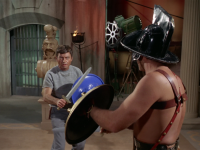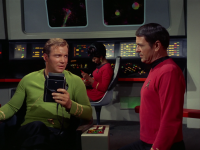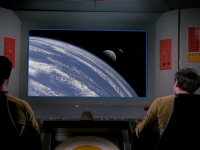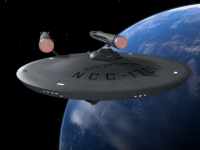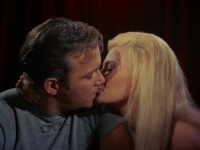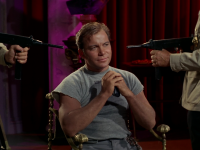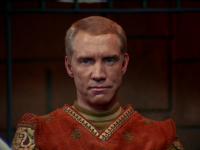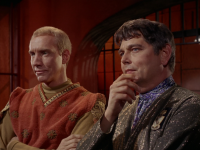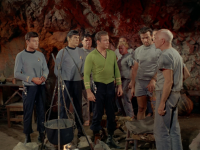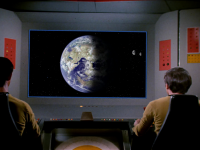Star Trek: The Original Series — 2x25 — Bread and Circuses
Synopsis
Spock and McCoy are forced to fight in Roman-like games.
Filler rating: bad filler
One of Star Trek's worst episodes and complete filler.
Remarkable scenes
- Guy with a gun to Spock: "What do you call those?" Spock: "I call them ears."
- McCoy and Spock arguing about logic in the jail cell.
- McCoy and Spock arguing at the dinner table.
- Spock's terrific performance as a gladiator.
- McCoy and Spock arguing in the jail cell again.
Review
Miri, The Omega Glory, and now Bread and Circuses. Why do alien planets mysteriously take on specific and precisely identical characteristics of Earth cultures seemingly at random so frequently? Why, "Hodgkin's Law of Parallel Planetary Development" of course! I applaud the episode for at least trying to come up with an explanation for this nonsense, but unlike the meddling of John Gill from Patterns of Force, this rationalization doesn't quite work. The very idea of something like "Hodgkin's Law of Parallel Planetary Development" existing as a natural law flies in the face of realism. There's just no way an alien planet, even an alien planet full of human-like aliens, is going to develop its own Roman Empire precisely identical to ours in nearly every way, except with 20th century American English, 20th century American technologies, and other such specific references.
It's kind of a shame too, because unlike Miri and The Omega Glory, this was a pretty entertaining episode. Sure it was a story about yet another Federation citizen tainting a society with yet another alien race that looks exactly like humans and yet another set of plot contrivances which exist solely to get the cast captured and forced to fight for the amusement of others, but when you set aside the cliches, this episode actually has a lot to offer. The idea of a Roman Empire which never fell and became much like the 20th century United States is intriguing. In this fictional society, slavery evolved into some form of wage slavery and the gladiator games were broadcast live on television with a characteristically familiar obsession with television ratings. Sure these details are gimmicky, but they're also pretty damn funny.
And then there's Claudius Marcus, who is one of the most delightfully amusing villains we've yet seen on Star Trek. Unlike most victims of cultural contamination by superior aliens, Claudius has no interest in procuring the advancements of the Federation for himself or his society. Instead, he perversely gets off on holding the Federation hostage to its Prime Directive. He even hilariously taunts Kirk by admitting that while he's well aware that the Enterprise could lay waste to the entire planet from orbit, he also knows Kirk is legally prohibited from doing so. He then spends the whole episode toying with the crew like a cat would with a bird for no reason other than his own amusement. On some level, you've got to respect that carefree recklessness. Finally, there are also several great moments featuring McCoy preying on Spock's insecurities about his human side, which was a nice touch.
But the fun ends there. And aside from the obnoxious issues with the episode's premise mentioned at the beginning of the review, there are also problems with its internal plot logic as well. Perhaps the most prominent example is the plot's bizarre dismissal of sun worship as not historically consistent with Roman theology. Apparently the writers have never heard of Sol Invictus. Likewise, the plot's dismissal of sun worship as a symptom of a primitive society while elevating the idea of worshipping the (alleged) son of god as a characteristic of an advanced society is downright offensive. Why should one religion be considered more valid than another? The way the story ends, after Uhura's exposition about the sun vs. son wordplay, everyone seems to rest easy by concluding that now that the aliens discovered Christianity, all the problems with their society will soon end.
That's an ending which aside from the sheer ridiculousness is hardly in the spirit of Star Trek which, for the most part, seems to advocate a progressive future without superstition guiding society's laws and moral code any longer. It's as shameful for Star Trek to resort to such blatant Christian evangelism as it is for Star Trek to tell a science fiction story on such a painfully weak premise as "Hodgkin's Law of Parallel Planetary Development." Do yourself a favor and skip this one.
